| Navigation |
| About • Origin • Spread • Various Examples • Search Interest • External References • Recent Images • Recent Videos |
About
The Dunning-Kruger Effect in psychology is a cognitive bias where people overestimate their limited competence or knowledge in a given social or intellectual field, leading them to hold superiority over people with objectively more knowledge in the field than themselves. The effect often inspires the less knowledgeable party to defend objectively false beliefs regarding the given field as to not look inadequate or less smart than they let on. In contrast, the effect claims that more competent people often underestimate their skill in a field. The effect has been graphed numerous times, with a graph measuring "confidence" against "competence" or "wisdom" in relation to the effect becoming the subject of memes throughout the 2010s and beyond. The effect is sometimes used to describe the spread of misinformation online as those with high confidence but low knowledge share information they believe is true but is not.
Origin
The Dunning-Kruger Effect is based on a paper published by Cornell University[1] on November 30th, 1999 by J. Kruger and D. Dunning. The pair were inspired to write it after an April 19th, 1995, robbery where a man named McArthur Wheeler attempted to rob a bank with his face covered in lemon juice, believing the juice would hide his face from security cameras. He believed this because lemon juice can be used as invisible ink on paper.[7]
The paper describes how Dunning and Kruger tested participants on their senses of humor, logic and grammar. The study found that those with the lowest performance scores were also the most confident in their abilities, describing their own skills in each field as "above average." The researchers conclude that this happened due to a problem with "the ability to analyze one’s own thoughts or performance," writing, "Those with limited knowledge in a domain suffer a dual burden: Not only do they reach mistaken conclusions and make regrettable errors, but their incompetence robs them of the ability to realize it."[2] Four graphs are included in the paper showing the results of each test (below from left to right: humor, logic and reasoning, logic and reasoning under different conditions, grammar).




Spread
On September 11th, 2014, Joseph Paris[3] published an article on his website titled "Lessons from Mt. Stupid," where he breaks down the Dunning-Kruger effect and how people can come out the other side of it more knowledgable. Paris describes the effect in stages: "Setting off on the Journey," "Climbing Mt. Stupid," "Reaching the Peak of Mt. Stupid," "Falling From the Peak," "Valley of Despair," "Slope of Enlightenment" and "Plateau of Sustainability." The "slope of enlightenment" and "plateau of sustainability" represent where someone should be ideally at a perfect balance of confidence and wisdom where they're aware of their skills but also willing to accept their incorrect beliefs. He provides a graph that illustrates these steps in relation to the effect, measuring it by "confidence" against "wisdom" (shown below, left). Another popular graph, used by sites including the Independent,[4] measures "confidence" and "competence" (shown below, right).


Numerous YouTubers have covered and described the effect in educational videos, including a 2019 video by After Skool and a 2021 video by Sprouts (shown below, left and right).
Evidence Contrary To The Dunning-Kruger Effect
Not everyone believes in the Dunning-Kruger Effect. In 2017, BS KING of Graph Paper Diaries[5] published a piece denouncing the usual Dunning-Kruger graphs as disingenuous based on the study's findings, writing, "I don’t mean to suggest the phenomena isn’t real (follow up studies suggest it is), but it’s worth keeping in mind that the effect is more 'subpar people thinking they’re middle of the pack' than 'ignorant people thinking they’re experts.'" In December 2020, Jonathan Jarry M.Sc. of McGill University published a study suggesting the effect is not real.[6]

Memes
In late 2021, the effect saw increased use as a way of calling out COVID-19 conspiracy theorists for believing in and spreading misinformation. On October 22nd, 2021, Facebook[8] page im not right in the head.com posted an edit of a Dunning-Kruger graph suggesting people who believe in anti-COVID-19 and anti-vaxx conspiracy theories are often the victims of the effect, placing "Facebook experts" at the peak of Mt. Stupid and doctors after the slope of enlightenment, gaining over 2,500 shares and 6,800 reactions in three months (shown below). On December 27th, Facebook[9] page Stop the Anti-Science Movement shared a tweet reading, "I don't call it Facebook anymore I call it the Dunning-Kruger National Park," gaining over 4,300 shares and 8,900 reactions in a month.

Various Examples






Search Interest
External References
[1] Semantic Scholar – Unskilled and unaware of it
[2] Psychology Today – Dunning-Kruger Effect.
[3] Joseph Paris – Lessons from Mt. Stupid
[4] Independent – How Meryl Streep showed us why the least able have no idea of their own incompetence
[5] Paper Graph Diaries – The Real Dunning-Kruger Graph
[6] McGill – The Dunning-Kruger Effect Is Probably Not Real
[7] Quartz – Why a bank robber thought covering himself in lemon juice would help him get away with it
[8] Facebook – Shared by Kenneth Wright
[9] Facebook – Stop the Anti-Science Movement
Recent Videos 4 total
Recent Images 17 total
Share Pin
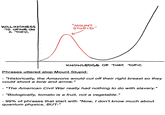
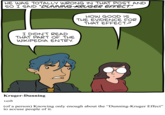
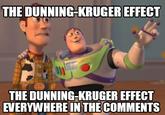
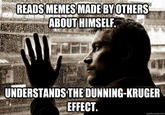
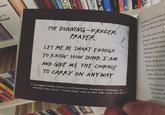





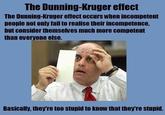
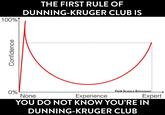
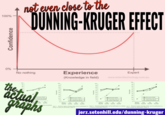




Comments ( 14 )
Sorry, but you must activate your account to post a comment.
Please check your email for your activation code.